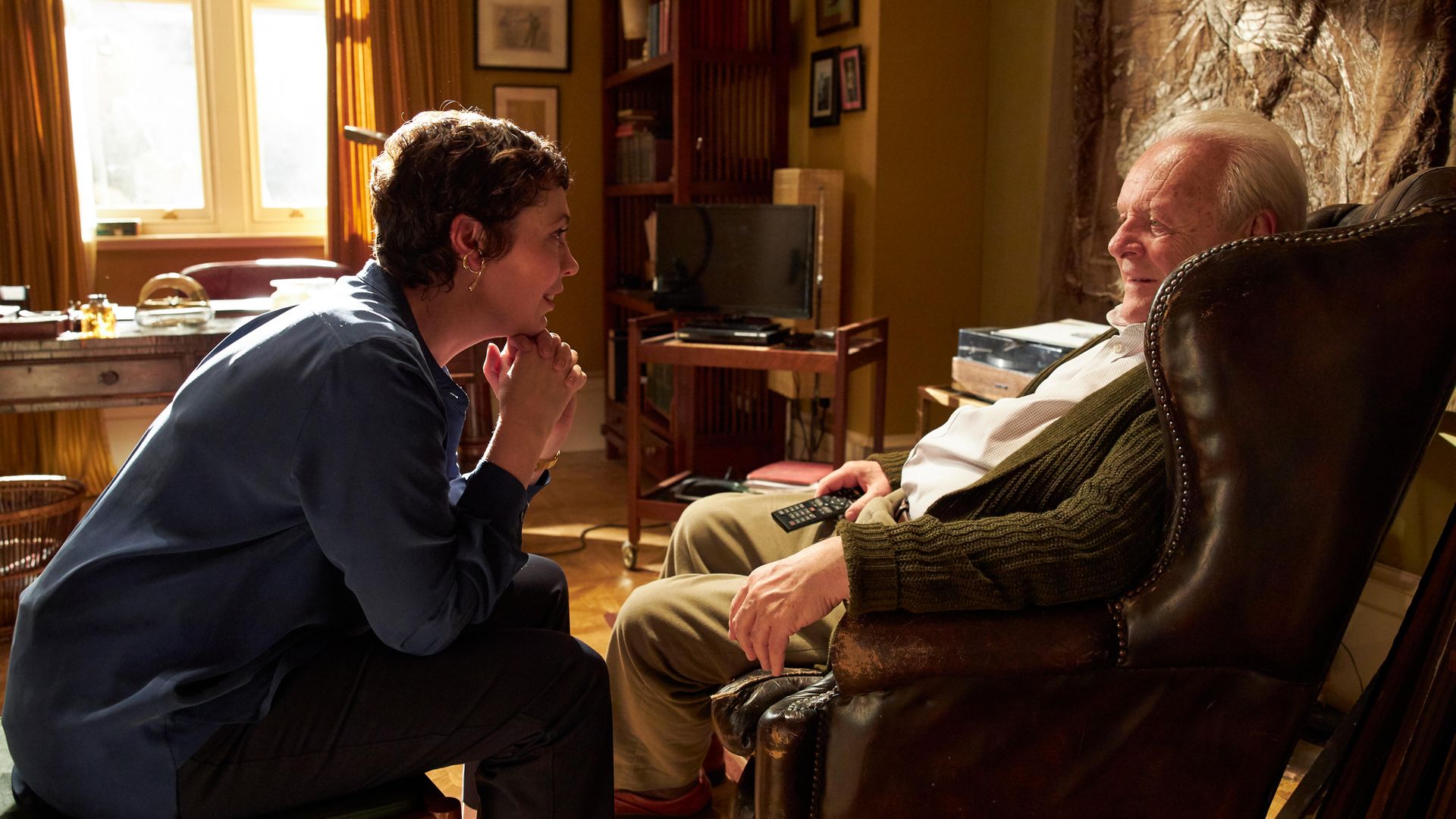
Jason Solomons looks at how Anthony Hopkins and Olivia Colman helped take The Father from French fringe play to the Oscars
It started life as a one-set play in a fringe theatre in Paris. Nine years later, The Father is now, as they say, a major motion picture and a very strong contender for this Sunday night’s Oscars, being held jointly at historic Union Station, Los Angeles and the swanky Dolby Theater in Hollywood.
The Father has bagged six nominations, including best film and best actor for Anthony Hopkins’ mighty performance at its heart. In its journey from the stage, The Father has also earned recognition in the adapted screenplay category, where it has already won a BAFTA for the collaboration between its original author, Florian Zeller, and the seasoned playwright and scriptwriter Christopher Hampton. His previous awards include those for adapting his own play of Dangerous Liaisons into the 1988 movie, and turning Ian McEwan’s novel Atonement into Joe Wright’s 2007 movie version.
But how does a small play, set in one diminishing room go from the Theatre Hebertot, up in the 17th arrondissement near Batignolles, in 2012 to the grandest stage of all on Oscar night 2021? “I could not be more surprised,” admits its creator, Zeller, who also makes a spectacularly successful first foray into film making by directing his own work. “I wrote it in French, I am French, and it is still strange to me to think of the play being performed around the world, let alone this film winning at BAFTA and being at the Oscars, you know, very British and American experiences.”
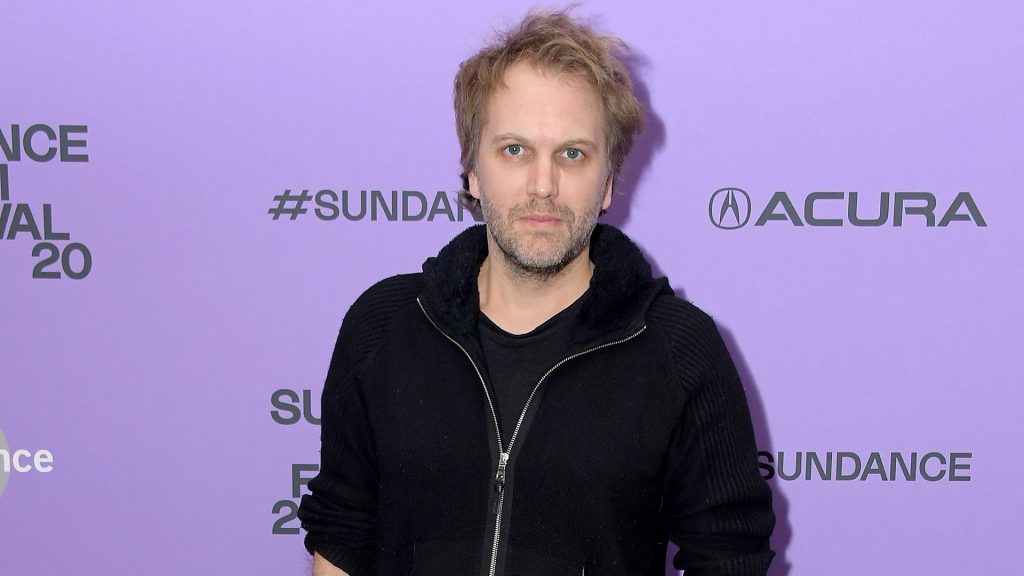
The play had an award-winning run in the West End, after a cautious start at the Ustinov studio theatre in Bath, with producers wary of audience nervousness around a play dealing with dementia. They needn’t have worried, it turns out. Kenneth Cranham had great success playing it in London, winning an Olivier award in 2105, while Frank Langella (whose nominated performance in The Trial of the Chicago 7 means he is up against The Father on Oscar night) got a 2016 Tony for it on Broadway.
Of course, anyone who sees the film will understand its success. It is, simply, an outstanding piece with a career-high performance even from Anthony Hopkins and wonderful support from Olivia Colman as the daughter of this man who is being gradually debilitated by dementia.
“Everyone has a father,” says Zeller. “And I suppose we all have to face this terrible question about what will you do with the people you love when confronted with dementia? I was raised by my grandmother who suffered from this when I was a teenager, so it was a very real pain for me, but of course, I realise now, that so many people have experienced this. And I think art is actually for precisely this purpose – letting you know you are not alone in the world, that we all share this pain and this difficulty and we are all in the same boat yet part of something bigger than ourselves.”
Zeller is a passionate chap, full of wild hair, a soft but insistent voice and sharp eyes and he has become a huge figure in European theatre, following up The Father with equally big hits The Mother and The Son. “Everyone has a mother, too,” he laughs, acknowledging he might be on to something here.
But while the movie of The Father is set in one location, it rarely feels like a play at all, using very cinematic techniques to tell the story, to put you almost in the head of this character who is losing his grip on reality. There have been films before about dementia (Julie Christie in Away From Her, Julianne Moore in Still Alice, both award-winning performances) but The Father makes you understand it from the point of view of the sufferer.
“I wanted to tell the story from the inside,” says Zeller, “something only cinema could do, so it’s very different from the play in that aspect – I could put the audience in the film and give them an active position, to feel as if they are losing their bearings.”
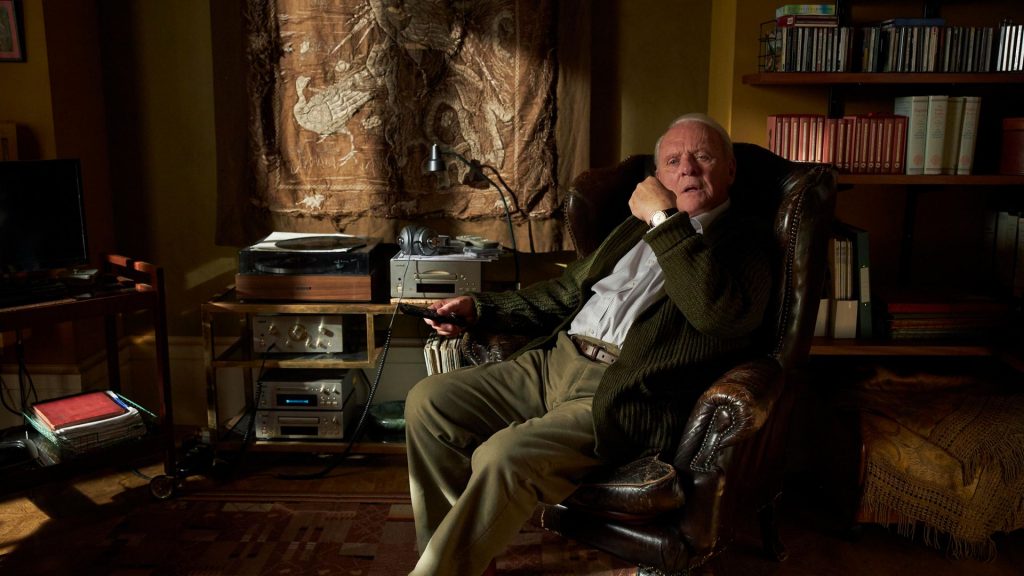
So the apartment in which Hopkins’ character lives is very much his home, a smart London mansion flat with good light and spacious rooms off a central corridor and a decent kitchen – the eagle-eyed will spot later that it’s in Maida Vale – but one which looks also like a well-to-do apartment in Paris or New York, or any sophisticated, bourgeois city (the play itself has been performed in 45 countries, including Singapore and Japan).
But this space changes gradually. Something looks a bit different, one scene to another. You’re not quite sure what, but a chair has moved, or a table, or a painting on the wall is no longer there. And soon Hopkins is surrounded by different people.
The woman he thought was his dutiful daughter Anne, played by Olivia Colman, is now played by Olivia Williams, but is still saying she’s Anne. And who is the chap reading the paper in the living room, who is Rufus Sewell one minute and Mark Gatiss the next? The subtlety of how these little metamorphoses creep up on you as a viewer, and on Hopkins as a character, are what make The Father so clever and affecting.
“I wanted the apartment to become a mental space, so the set is a character in the drama. When I wrote the script, I drew the layout of the flat because it was going to change in different ways and the audience had to feel like they know it well, the knick-knacks and the furniture, so that when it alters, they are disorientated and in doubt. It’s a labyrinth and a puzzle and I like to say I keep one piece missing because that’s how Anthony Hopkins’ character feels, like it all doesn’t quite fit.”
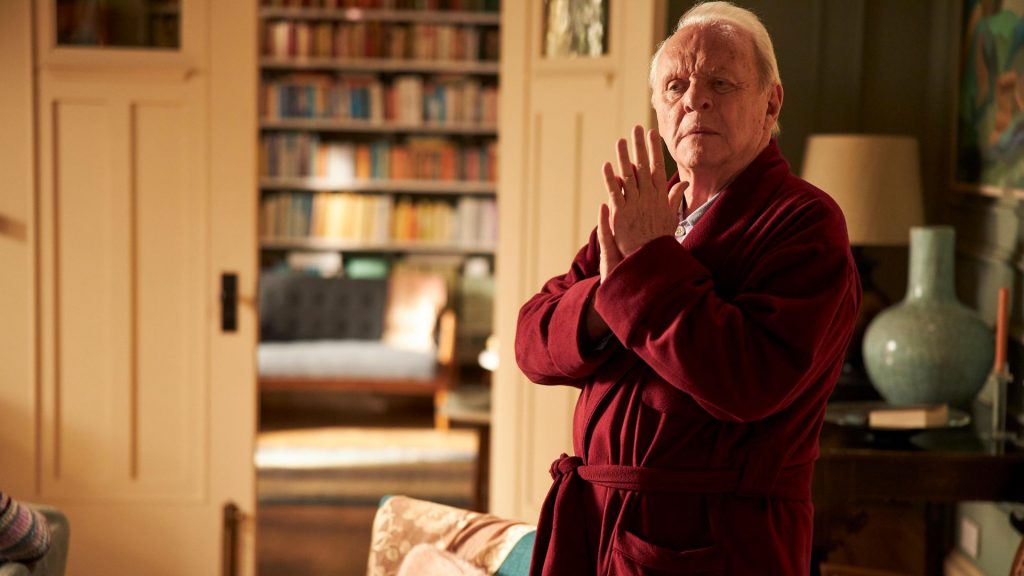
I keep referring to Hopkins. Of course, he is a giant presence throughout, but he is also the whole experience: the main character is called Anthony. Although he is Andre in the French original, Zeller says his dream was to have Anthony Hopkins play the part if it ever became a movie.
“I wrote the film script in French, of course. But that’s why I wanted to translate it into English, so that I could offer Anthony Hopkins the part, and I felt if I called the character this name, it would somehow manifest itself. My friends told me it was impossible to get Hopkins for a first-time filmmaker but I kept believing. Even so, I still cannot believe that this dream came true.”
For Christopher Hampton who translated and adapted The Father for the London stage and for this film, he admits to having Hopkins in mind all through the writing. “As soon as Florian told me who he was dreaming of, I thought I might as well write with Anthony in my ear, so yes, I did tailor sentences to his specific style, those abrupt jolts of energy or anger that he does and certain actor’s devices he uses for effect, we know them so well so I thought I’d put them in as he might enjoy playing them and be very good at it… and it worked.”
After sending the script off to Hopkins’ agent, Zeller got a call months later saying Hopkins would like to meet in LA. Zeller and Hampton “hopped” on a plane to LA, to breakfast at the Bel Air Hotel, and two hours later, Hopkins said: ‘Ok, let’s do it now.’
“I just knew it was a part I could play, you know,” says Hopkins from his LA home. “The scenes in the script were so sharp and clear, so compact. And it was really the best time of my life on a set, really. I let the script and the set do the work and I would just wander through it and speak my lines. Cup of tea and a bit of lunch and it was all very relaxed and, if you have a first-rate script, that’s how you get to reach great moments.”
For many viewers, the thought of a dementia drama might be too much, but The Father never feels like it’s pushing for tears or emotions. There’s a lot of love in the characters, between Olivia Colman as the daughter clearly heartbroken watching her father slip away. Hers is a fabulous supporting performance, too, it must be said, tinged with personal connection.
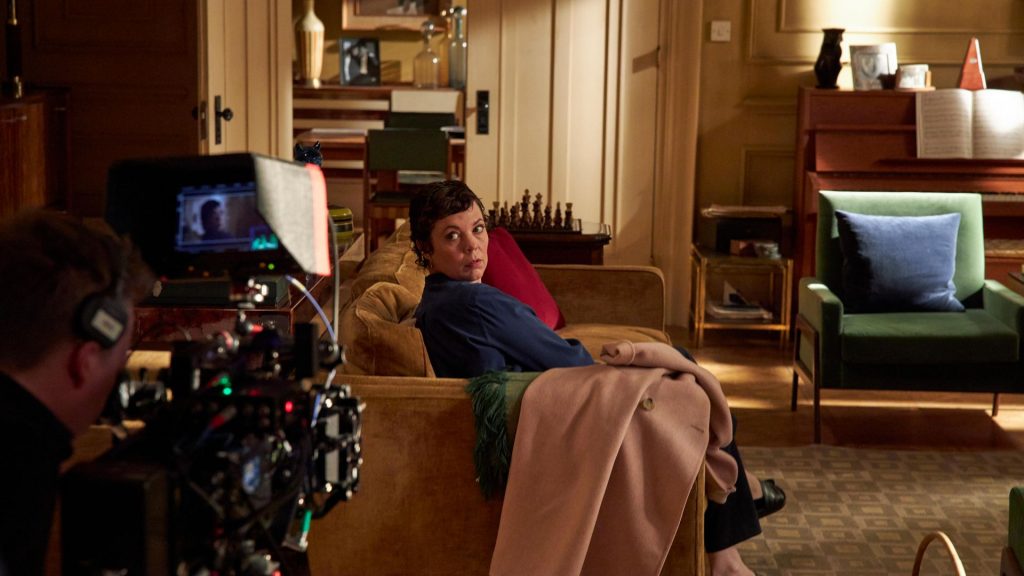
“My mother was a district nurse and she specialised in geriatric and dementia care,” she recalls. “And I used to go on visits with her in the car during the school holidays so I was used to talking about it and seeing it while I was quite young, but it all returned to me filming this. I just had look into Anthony’s eyes and feel like I was the one making these terrible decisions between my own life and that of my father.”
As a film, The Father feels so very personal and will strike chords of recognition with so many. It has already met with approval from Alzheimer’s and Dementia groups and will doubtless help many people who are touched by it.
“When people saw the play,” recalls Zeller, “they would come back after and the first thing they would blurt out was their own connection to it, as if they’d been desperate to share this story about their own father or mother. And the same is happening with this film, so I know there’s something very cathartic about the material even if it sounds daunting or emotional to describe it. And this wasn’t to be about a clinical perspective of dementia but it was about knowing what’s inside of all of us, the fears, anger, anxiety about our mortality and fighting against all this.”
The film was shot on a specifically designed set in West London Film Studios in Hayes, with great attention to making it a space the actors could feel at home in. The furniture was chosen, particularly Anthony’s armchair, which had to feel like his favourite old chair and be a specific height for Hopkins, 83, to be comfortable filming in.
The film’s Oscar-nominated production designer, Peter Francis, says: “For me, it was always a film about memories, not dementia. So all this character’s history, his life, has to be on that set, all the little details revealing something about his past, each knick-knack is poignant to a certain period of his life and they disappear as his memory fades.”
Changes in colour and tone gradually signal to the viewer that things are altering but it is never obvious and never cruel, although you’re always with Anthony and his confusion, struggling to process it, to comprehend it, feeling played with, teased. It is ingenious to watch and it’s as if Hopkins himself brings the ghosts of his previous roles into the room – there’s a remnant of Hannibal Lecter that flashes in those eyes when confronted, but there’s also the dignity of Remains of the Day, the mischief of Magic, the clinical calm of The Elephant Man, the stoicism of Shadowlands and, most devastatingly, the impotent rage of his King Lear.
All of these characters somehow sit alongside this new one, without any obvious references or allusions. According to Zeller that was always part of the puzzle. “Audiences are very smart and they like to play with the information and will make their own versions with the pieces of the puzzle you give them. But the brain can’t understand everything, so I say don’t try to figure everything out, let your emotions do the work.”
At 83, Hopkins could become the oldest winner of the Best Actor Oscar. He takes on fewer roles these days, of course, although he was nominated only last year for The Two Popes, too. But this part in The Father clearly had great personal resonance for him, as it will do for so many viewers.
“I thought there’s a belligerence about this character that reminded me of own father,” he told an audience of BAFTA members last month. “He was a baker, worked every day, but tough and he died slowly of heart disease and he’d get very depressed and angry about it. And I know he was frightened about dying and I saw that immediately in this script, because it’s also part of me, those moments of rage and vulnerability and this was my change to be my own father really, and for his toughness and resilience, he’d have crying fits and I couldn’t stand to be around and watch those. It’s so hard for men to see their fathers cry. But it was so clear to me, so close to me.”
The Father is certainly one of the best films of the year, released into cinemas in the UK on June 11. Zeller has just secured the funding for his follow-up, an adaptation, with Christopher Hampton again, of their play The Son, which will star Hugh Jackman and Laura Dern and be set in New York, about a father coming to terms with the behaviour of his son from a previous marriage.
Having conquered the theatre world and been named the most exciting playwright of his generation, Zeller looks set to make a lasting mark on the film world. The Father is a scintillating debut with a tour de force performance from one of the cinema greats. Whatever awards await it at the Oscars, the sheer power and tenderness on display already assure it of an enduring and rare classic status, on stage and screen.
***
That Oscar movies often come via the stage for inspiration is no novelty – Shakespeare is by far the most adapted source material in film history and Olivier’s Hamlet won Best Picture in 1949. In this year’s awards race alongside The Father are film adaptations of successful plays One Night in Miami and August Wilson’s Ma Rainey’s Black Bottom.
Here are my five favourite stage-to-screen adaptations that achieved Oscar glory:
Amadeus was winner of eight Academy Awards at the 1985 ceremony, the haul including adapted screenplay for playwright Peter Shaffer. His 1979 play, starting at the National Theatre in London with Paul Scofield and Simon Callow under the direction of Peter Hall, had itself been inspired by an Alexander Puskin short play Mozart and Salieri, from 1830, which became a Rimsky-Korakov opera in 1897. It moved to Broadway in 1981, with Ian McKellen and Tim Curry, and won a Tony, before director Milos Forman and Shaffer re-worked the script into the movie version.
Twelve Angry Men began life as CBS television play in 1954, adapted for the stage by its writer Reginald Rose a year later. Henry Fonda pushed for the 1957 film version, as producer and taking the chance to play Juror 8, hiring director Sidney Lumet. The title changed to use the digits 12 Angry Men. It was nominated for three Oscars, but lost out to The Bridge on the River Kwai.
Casablanca based on the unproduced play Everybody Comes to Rick’s by Murray Burnett and Joan Alison, optioned by Warner Bros for $20,000 before it could be staged. It won best picture in 1944. The play, which included the song As Time Goes By, was finally performed, for six weeks, in 1991 at the Whitehall Theatre in London.
A Streetcar Named Desire was adapted by Tennessee Williams from his own 1947 Broadway play. It earned 12 Oscar nominations at the 1952 ceremony, winning four, including one for Vivien Leigh’s Blanche DuBois, although not for Marlon Brando’s now even more iconic performance as Stanley Kowalski.
Moonlight was based on an unperformed play In Moonlight Black Boys Look Blue. Dug out of a drawer a decade after being shelved, it was adapted by the original author Tarell Alvin McCraney for Barry Jenkins’ 2017 best picture winner, which pipped La La Land to the post in the most dramatic finale ever.
What do you think? Have your say on this and more by emailing letters@theneweuropean.co.uk
Warning: Illegal string offset 'link_id' in /mnt/storage/stage/www/wp-includes/bookmark.php on line 357
Notice: Trying to get property 'link_id' of non-object in /mnt/storage/stage/www/wp-includes/bookmark.php on line 37







